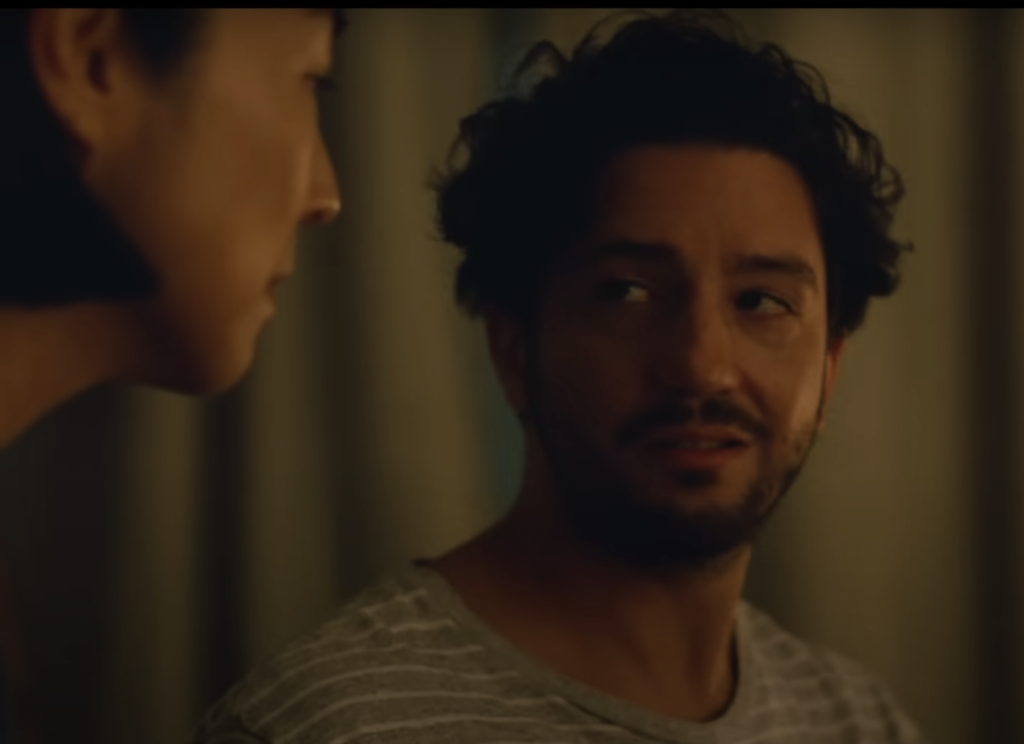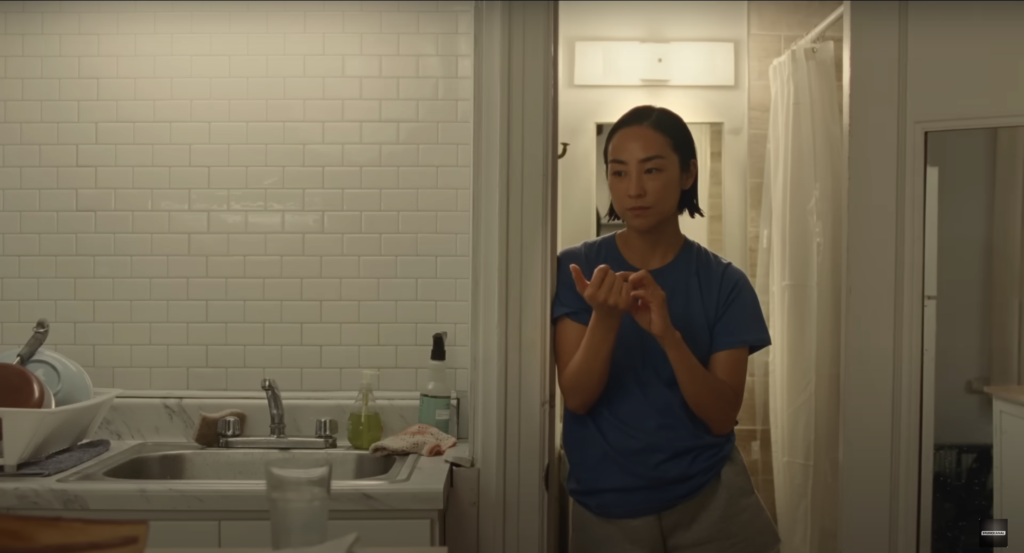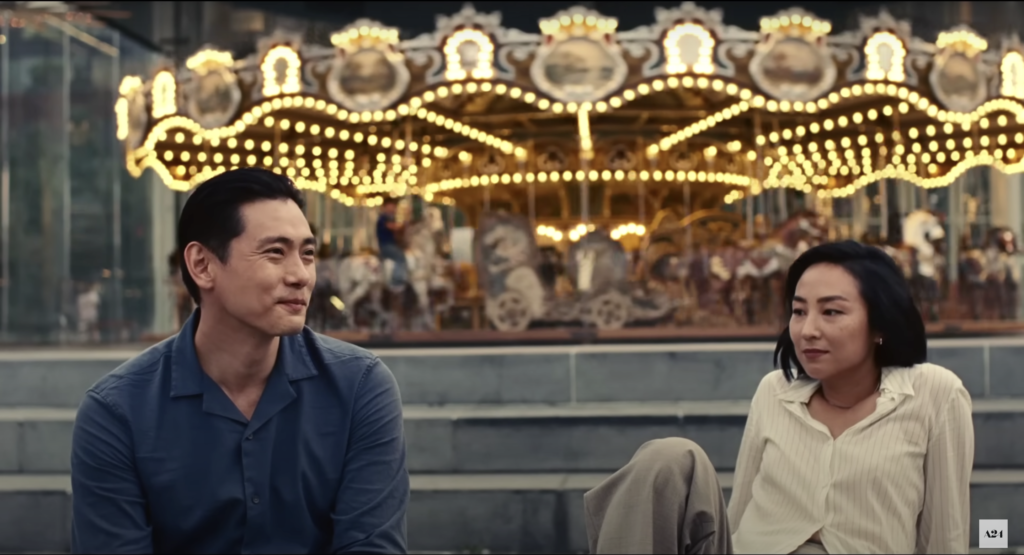
In a striking image from Korean-Canadian director Celine Song’s debut film Past Lives, 12-year-olds Na-young (Greta Lee) and Hae-sung (Teo Yoo) take different roads home during their final day together before Na-young’s family emigrates to Canada. This image, with Na-young ascending a staircase, sets the tone for the rest of the story.
The childhood friends take different paths in life, but remember each other and consider what life would have been like if their choices were different. Somewhat misleadingly labeled as a romantic drama, the love triangle with Na-young (who goes by her English name Nora), her husband Arthur (John Magaro), and Hae-sung dramatizes the struggle for self-identity that Nora experiences throughout her life. Past Lives functions best as a meditation on how the paths we take (and the ones we don’t) shape our identities.
The film defies conventions of the romance genre, as there is not much tension around whether the characters Nora and Hae-sung will actually get together. Repeatedly, they choose themselves over one another. In the first act, in which Nora (then Na-young) and Hae-sung are children, neither has much control over their immediate futures. Na-young’s family has chosen to emigrate to Canada. When, in the second act of the film, the two reencounter each other through Facebook after 12 years, one can feel palpable chemistry between them, but also see that each of them prioritizes other life choices over reuniting in person. Hae-sung chooses to move to Shanghai to study Mandarin rather than visit Nora in New York, while Nora states that she cannot come to Seoul for at least another year or two due to her playwriting aspirations.

When the final act comes around (set 12 years after the second one ends), it does not ever feel like Nora will choose to run off with Hae-sung. Arthur has a monologue in which he frames Nora and Hae-sung’s relationship as a “good story”, in which he is the “evil white American husband standing in the way of destiny.” The key word here is “story”–one that Hae-sung and Nora have had in their minds at various points. Nora, however, affirms to Arthur that her life with him is the one she has chosen.
The film is primarily interested in how Nora’s romantic partners signify choices that have shaped her future and her own identity. For instance, Nora’s marriage to Arthur allows her to obtain a green card and remain in New York. Her choice to marry an American writer reflects her aspirations from childhood – as she stated during her last day of school in Korea, she planned to move to Canada because “Koreans don’t win the Nobel Prize for literature.” Throughout her life, she has associated North America with opportunities as a writer, and she has consistently decided to pursue those opportunities. Even Hae-sung observes that she is always the same in this regard; only the name of the prize she is seeking changes.

Nora’s mother stated during one scene that immigration means losing some things, but gaining others. Nora’s relationship to her “Korean-ness” evolved over time, starting from when she changed her name from Na-young to Nora. In Korea, Na-young was known as a “crybaby”. A short scene in which she stands alone at recess briefly depicts Nora’s struggle to adapt in a new environment. She tells Hae-sung, “I used to cry a lot but I realized no one cared,” confirming her isolation and change in her emotional responses as a defense mechanism. The film does not delve much more into assimilation or other pressures upon immigrants, but even this glance provides a lot of insight into Nora’s experiences.
Past Lives illustrates how an immigrant’s relationship to her birth nation and culture shifts over time. During Nora’s Skype calls with Hae-sung, he observes how her Korean has become rusty. When she and Hae-sung meet up in New York, Nora shares with Arthur that Hae-sung is “SO Korean” in his values, mindset, and even looks. She expresses that. she simultaneously feels more and less Korean while with him. By contrast, Nora can see how Americanized she has become, and experiences some distance from Hae-sung and her own past self.

On the other hand, she holds on to many aspects of Korean language and culture. Arthur laments that Nora talks aloud in Korean while asleep, and he cannot understand Korean and know all that Nora is thinking. One can also see how Korean concepts (in this case, stemming from Buddhism) have influenced her thinking through her discussions of “in-yeon,” or fate, which views people’s current relationships as the accumulation of interactions over lifetimes. Nora and Hae-sung banter about what they could have been in past lives: perhaps they were married, or perhaps a bird and a branch it would sit on. In-yun describes a bond with someone based on destiny rather than free will. Even though Nora has chosen a marriage with Arthur and will remain loyal to him, there is still undeniable depth in her connection with Hae-sung that she feels compelled to explore.
The film is Nora’s story, but the glimpses into Hae-sung’s life are also fascinating, and more insight into his character would be welcomed. We sense some discontent in Hae-sung’s life: he states that he has an “ordinary” job with “ordinary” pay (and long hours without overtime), that does not allow him the money and status to marry his girlfriend. Aside from the scene when they meet, we don’t see Hae-sung’s girlfriend, and we only see brief scenes with him eating his with parents and drinking with friends. It seems that he wants to see Nora to break out of his humdrum life, but we could see more of his motivations to underscore the themes of the film.

The naturalistic, nuanced performances of the three main actors help make the story and its philosophical questions work. Greta Lee as Nora, Teo Yoo as Hae-sung, and John Magaro as Arthur all convey complex emotions in both their dialogue and in expressions. Even through silent moments, one can sense Nora’s introspection, Hae-sung’s yearning, or Arthur’s simultaneous desires to support and cling to his partner.
Past Lives is an assured debut film from Celine Song, and a promising collaboration between American and Korean studios A24 and CJ Entertainment. It effectively portrays Nora’s story as a Korean immigrant, but is also universal in its existential questions about the choices we make in life, and its message that we gain and lose something with every choice.
(Source: YouTube. Images via A24, CJ Entertainment.)

0 Comments